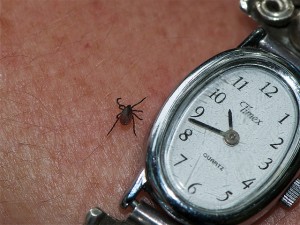Lyme Disease and Health Insurance
Jul 26th, 2013
Lyme disease affects millions of Americans every year, and the number of infections is growing steadily. The disease is caused by a species of bacteria found in deer ticks.
Contraction of Lyme disease happens when individuals are exposed to ticks, usually in outdoor settings such as parks, grass, and woodland areas. Tick bites result in a transmission of the bacteria that is thought to cause the disease, and the infected individual generally develops symptoms of nausea, fatigue, and sickness, that are flu-like. In classic cases, the disease is diagnosed through blood tests, traditionally marked by the discovery of a red ring around the area of infection, known as a “bulls-eye”.
The typical course of treatment for Lyme disease is a short-term regimen of antibiotics, which normally results in patient recovery from the symptoms associated with the illness.
However, there is much controversy as to whether or not these treatments are effective.
Post-treatment Lyme Disease Syndrome, as it is termed, is said to affect thousands of individuals diagnosed with Lyme. The syndrome is marked by the persistence of Lyme disease symptoms such as nausea, fatigue, sickness, and joint pain, which can result in depression, an inability to function or work, and a generally compromised quality of life.
Individuals with PTLDS claim that these ailments persist for years, long after the traditional treatment has run its course. Although some doctors confirm the appearance of this condition, the scientific community remains mixed on the subject, and since there is no concrete evidence that suggests the persistence of Lyme disease post-treatment, health insurance providers, as well as the CDC, are hesitant to endorse methods of long-term treatment, such as intravenous antibiotics. The scientific community’s overall response to PTLDS and its treatments means that many individuals who suffer from the disease are forced to pay out of pocket for courses of treatment that may prove affective.
However, a closer look at the controversy reveals that the debate is not as clear-cut as it may seem. The long-term affects of Lyme disease are unknown, as is its relationship to other diseases. The fatigue, nausea, and other symptoms associated with PTLDS may also be signs of another disease entirely, such as one of a number of possible autoimmune diseases.
Moreover, because little is known of the viability, treatment, and nature of PTLDS, specific treatments can be dangerous and harmful to patients. Medical experts agree that further research should be done on Lyme disease, and non-profits such as The Lyme Disease Association, Inc., are dedicated to raising money for such research, aiding in awareness and knowledge of the disease, as well as providing resources to Lyme sufferers nationwide.
Health insurance providers are clear in that they refuse to treat the controversial long-term effects of Lyme Disease, and providers will likely continue to deny coverage until the CDC and The Infectious Disease Society of America (IDSA) confirm PTLDS as a legitimate illness.
Lack of insurance coverage has caused many patients to pay out-of-pocket for extremely expensive treatment plans, often putting them in financial peril. And since PTLDS, also referred to as Chronic Lyme Disease, is not officially viewed as an illness, it is not likely that it will qualify as a pre-existing condition under the Affordable Care Act, which is slated for full implementation by January 2014.
So what should people do to stay informed, find treatment, and prevent further health problems related to Lyme disease? In light of the above facts, it may seem that people who claim to have and suffer from PTLSD are out of luck and that insurance companies will not provide any help in aiding in their recovery.
However, it is important to stay informed on current research. Advances in research in the coming months or years may aid in the knowledge of the long-term effects of Lyme disease, and how they can be effectively diagnosed, and treated, across the board.
Patients who have Lyme and are experiencing symptoms of fatigue, nausea, joint pain, and/or flu-like symptoms, should be continually aware of their health, and be tested for other diseases with similar symptoms regularly. Individuals who cannot work due to the debilitating effects of these symptoms may be able to receive disability compensation from the government.
As the controversy surrounding Lyme disease and the treatments associated with it continues, scientific advances in research will hopefully catch up to the unknown effects of the disease, so those who are affected can sooner begin the recovery process, without the threat of denied coverage.
Peter Res is a writer, poet, and editor. In addition to writing for Vista Health Solutions he is currently an adjunct professor of Writing and Composition at Centenary College of New Jersey, and an editor for the literary magazine Collective Fallout.
Related posts from our blog:
No related posts.
Tags: health care | health insurance | lyme disease | New York
